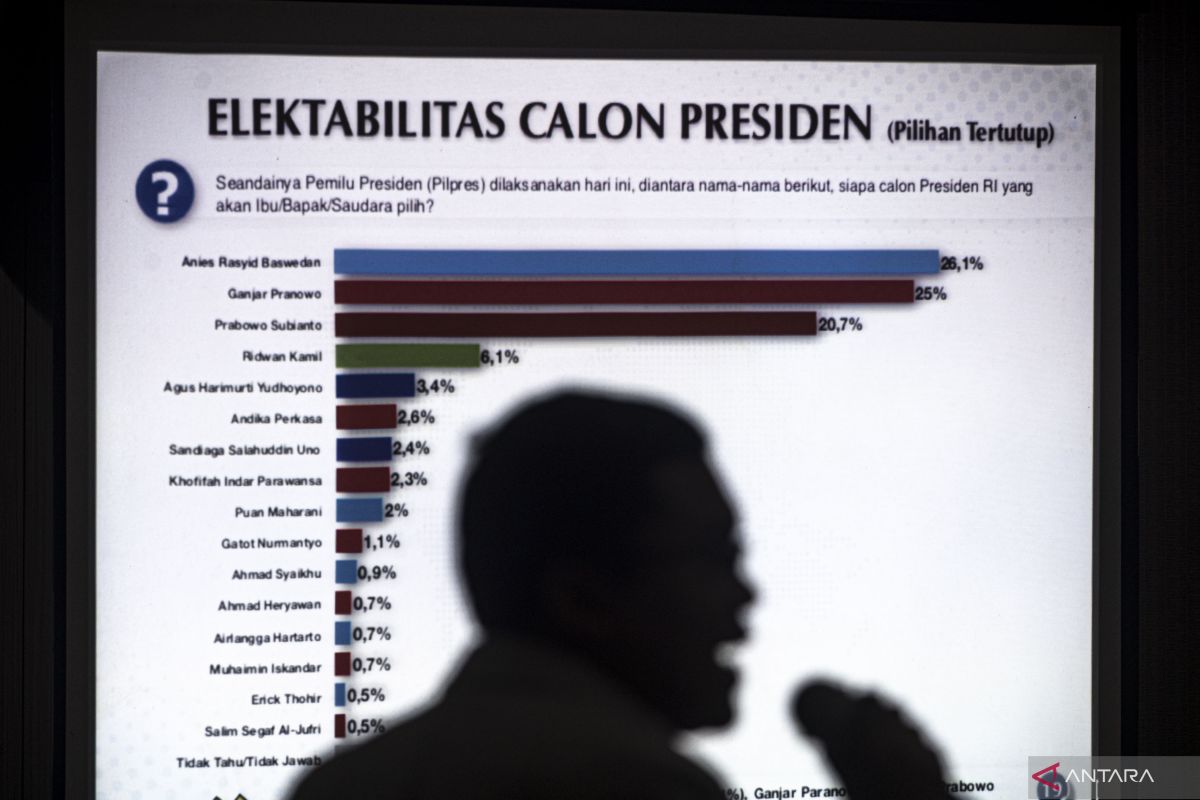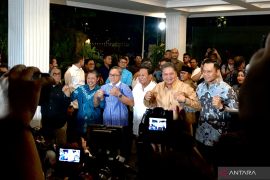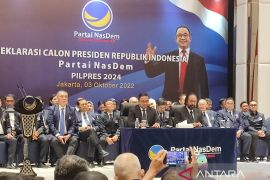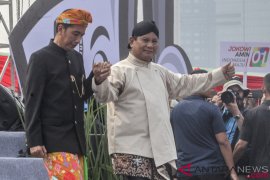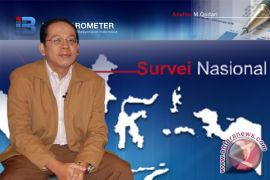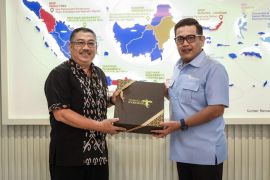The General Election Commission (KPU) is set to start the registration of presidential and vice presidential candidates only in September 2023. However, a few parties have announced their presidential candidates.
Only National Democratic (Nasdem) Party and the Indonesian Solidarity Party (PSI) have announced their presidential candidates. Nasdem chose former Jakarta governor Anies Baswedan and PSI picked Central Java Governor Ganjar Pranowo to run for president.
The other political parties including the Indonesian Democratic Party of Struggle (PDIP) which won most votes in the 2019 legislative election has yet to announce its presidential candidate.
The United Indonesia Coalition (KIB) which comprises Golkar Party, National Mandate Party (PAN) and United Development Party (PPP) which make up around 25 percent of the seats in the House of Representatives (DPR) is still undecided about its presidential candidate.
Golkar Chairman Airlangga Hartarto said KIB will declare its presidential candidates shortly before the registration of presidential and vice presidential candidates in September 2023.
At least three figures topped the list of potential candidates for the 2024 presidential race based on the results of many electability surveys. They are Ganjar, Anies and Greater Indonesia Movement (Gerindra) Party chief Prabowo Subianto concurrently defense minister.
The survey conducted by Saiful Mujani Research and Consulting (SMRC) from December 3 to 11, 2022 found Ganjar was ahead of Anies and Prabowoo with the electability rating of 33,7 percent in an open simulation.
Anies came in second place with the electability rating of 28.1 percent, and Prabowo secured the third place with the electability rating of 26.1 percent . Meanwhile, 12.1 percent of respondents did not decide their choice.
The survey conducted by the Center for Political Communication Studies (CPCS) showed Ganjar secured the highest electability rating of 24.1 percent,with Prabowo trailing behind in second place with 22.3 percent and Anies securing third place with 21.4 percent.
"Ganjar, Prabowo, and Anies ranked top three in the presidential race, followed by AHY (Agus Harimurti Yudhoyono) who overtook RK (Ridwan Kamil) and Sandiaga Uno," CPCS executive director Tri Okta said.
Okta said the electability of Ganjar showed an upward trend in the past couple of years. Meanwhile, the electability of Prabowo tended to be stable so that Anies had a chance to overtake him.
“Prabowo still enjoyed the high electability after the 2019 general elections. But it is Anies who seemingly got the momentum after being officially nominated by Nasdem," he said..
This means that if the trend remains until next year Ganjar and Anies will tightly compete with one another and leave Prabowo behind, Okta said.
However, the survey conducted by the Jakarta Survey Institute (LSJ) showed 34.2 percent of President Joko Widodo (Jokowi) ’s supporters in the 2019 presidential race said they would vote for Prabowo who stood against Jokowi in the 2019 election,
“The result (of the survey) showed 34.2 percent of Jokowi’s supporters will choose Prabowo Subianto,” LSJ researcher Iqbal Mawardi said.
Meanwhile, 32.4 percent of them will vote for Ganjar and 14.8 percent will vote for Anies.
The remaining 18.6 percent will vote for other figures and are still undecided about their preference.
The other survey conducted by SMRC showed support for Ganjar’s bid for presidency is getting stronger, while Prabowo and Anies will tightly vie for second place.
"If the presidential election is held when the last survey is conducted there will be three figures who will receive significant support. They are Ganjar Pranowo, Prabowo Subianto, and Anies Baswedan. The other figures will be far left behind,” SMRC research director Deni Irvani said.
If there are only three candidates who will compete, namely,: Prabowo vs Ganjar vs Anies, Ganjar will be ahead of the other two candidates,” he said.
Although the three potential candidates for the 2024 presidential race have the highest electability rating their bid for presidency still hinges on a party or coalition of parties which must meet a 20 percent presidential threshold.
Based on the 2017 Election Law, a party or coalition of parties must secure at least 20 percent of the seats at the House of Representatives (DPR) or 25 percent of the popular vote to nominate a presidential candidate in the 2024 election.
Only Nasdem which has seats in the DPR has announced its presidential candidate. The party holds 59 seats at the parliament or 9.05 percent based on the results of the 2019 elections. This means that it needs to coalesce with other parties to meet the 20 percent presidential threshold.
Gerindra of which Prabowo is chair has 78 seats or 12.57 percent. Meanwhile, no parties have nominated Ganjar to run for president
The 2024 general elections which will be held on February 14, 2024 will not only elect president and vice president but also members of the House of Representatives (DPR), Regional Representatives Council (DPD), Provincial Legislative Council (DPRD), District and Municipal Legislative Council. Later in the same year, the country will also host regional head elections.
President Joko Widodo described the 2024 elections as a crucial time for politics since during that time, Indonesia would host the largest democratic fiesta simultaneously.
The elections will be the largest ever democratic fiesta in Indonesia, if not the world, the president said during the national consolidation meeting of the General Election Supervisory Agency Bawaslu in Jakarta.
"Compared to the previous elections, (the 2024 elections) will be the largest (ever held). Be careful (the elections) will likely be the heaviest. (Once again,) be careful (the elections) will involve a huge number of voters with a wide election span,” he said.
A total of 24 parties registered with the KPU to run in the election. On 14 December 2022, the KPU announced that only 17 of them passed the factual verification process and are eligible to contest the legislative election. The KPU also declared six local parties which will only contest elections in Aceh province.
The 17 parties are the Indonesian Democratic Party of Struggle (PDIP); Prosperous Justice Party (PKS); Indonesian Unity Party (Perindo); National Democratic (NasDem) Party; Crescent Star Party (PBB); Archipelago Awakening Party (PKN); and the Indonesian Transformation Movement Party (Garuda).
Next are Democratic Party (PD); Indonesian People's Wave Party (Gelora); People's Conscience Party (Hanura); Great Indonesia Movement Party (Gerindra); National Awakening Party (PKB); Indonesian Solidarity Party (PSI); and National Mandate Party (PAN), Golkar Party; United Development Party (PPP); and Labor Party.
Meanwhile, the six local Aceh parties are the Aceh Party, Aceh Prosperous Justice Party (PAS Aceh), Aceh Beusaboh Tha'at and Taqwa Generation Party, Darul Aceh Party, Nanggroe Aceh Party, and Sira Party (Acehnese People's Independent Solidity).
According to the latest data, 189 million people were recorded as voters, who would participate in the 2024 simultaneous elections, with a voting time of around six hours.
in a bid to map out all factors that could disrupt and hinder the implementation of a democratic 2024 election. the Bawaslu launched the 2024 Election Vulnerability Index (IKP).
"The Election Vulnerability Index is an early warning system that we start (as initial preparations) for the implementation of the 2024 Election," Bawaslu Chief Rahmat Bagja stated while addressing the launch of the 2024 Election Vulnerability Index and Simultaneous Elections in Jakarta.
Bawaslu announced five provinces, with the highest vulnerability level during the general election based on the 2024 General Election Vulnerability Index (IKP).
Bawaslu's member, Lolly Suhenty,
said the index refers to the provincial bawaslu input result approach.
The five provinces are Jakarta, with a vulnerability score of 88.95; North Sulawesi, 87.48; North Maluku, 84.86; West Java, 77.04; and East Kalimantan, 77.04.0
A total of 21 provinces have medium vulnerability level. They are Banten, 66.53; Lampung, 64.61; Riau, 62.59; Papua, 57.27; East Nusa Tenggara, 56.75; North Sumatra, 55.43; Maluku, 53.69; West Papua, 53.48; South Kalimantan, 53.35; and Central Sulawesi, 52.90.
The others are Bali, at 52.75; Gorontalo, 45.44; West Sulawesi, 43.44; Yogyakarta, 43.02; Riau Islands, 40.33; West Sumatra, 39.68; Southeast Sulawesi, 38.32; Aceh, 38.06; South Sumatra, 35.07; Central Java, 34.83; and Bangka Belitung Islands, 29.89.
Meanwhile, eight provinces with low vulnerability level are North Kalimantan, 20.36; Central Kalimantan, 18.77; East Java, 14.74; West Kalimantan, 12.69; Jambi, 12.03; West Nusa Tenggara, 11.09; South Sulawesi, 10.20; and Bengkulu, 3.79.
Related news: Govt educates public on political party determination for elections
Related news: Progress of democracy depends on women's participation: Bawaslu
Editor: Rahmad Nasution
Copyright © ANTARA 2022
